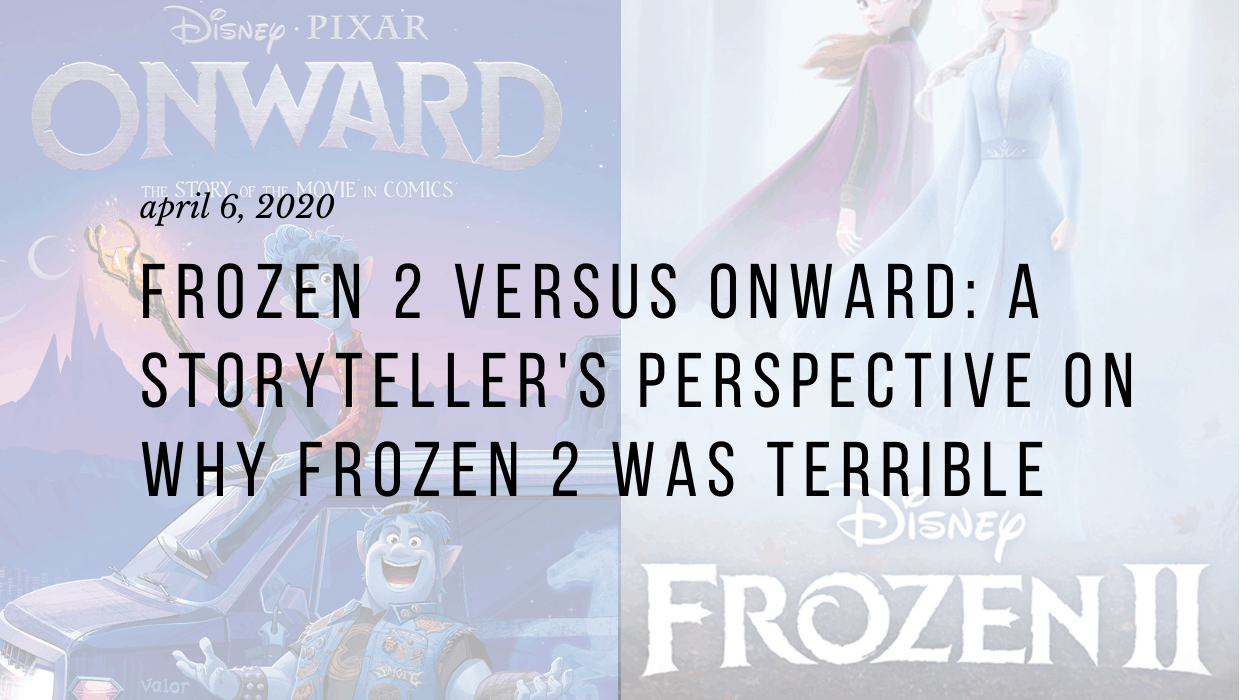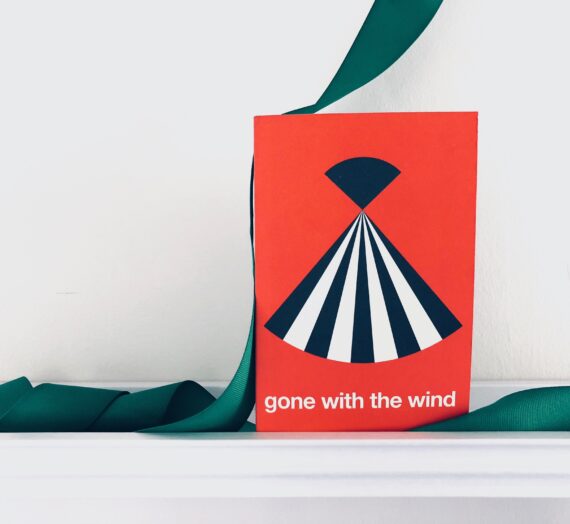These past couple of weeks I have watched more movies than I’ve watched in the last five years. As a writer, I immensely enjoy watching movies to see the set up for stakes, the motives, the plot points, etc. It is a very rewarding experience, because it’s all the same tools we use in writing, and it’s all the same things that get you hooked to a novel. That is, when the movie is good. I loved Frozen just like most of the world, so I was very excited to finally see its sequel. Guys, I couldn’t even finish Frozen 2 it in one sitting, it was THAT frustrating. But then we watched Onward, and I was hooked within five minutes. Let me explain the difference.
Disclaimer: I have seen both of these movies only once, and I absolutely did not re-watch them just to perfect this blog post, so it’s very likely small details have been forgotten.
There will be spoilers for both movies, so don’t read if you want to protect thine virgin eyes!
Why Frozen 2 Was Terrible:
- Motives: This is probably where the movie failed the most, because there are tons of missing motives. I’ll just discuss a couple.
Right off the bat, Elsa feels the need to follow the strange singing. WHY does she need to do this? WHY is the pull so strong she is going to abandon her role as queen? We needed to see Elsa feeling unfulfilled or as if she was missing something PRIOR to the strange singing, so that when Elsa decides to follow it, everything makes sense.
There’s a whole song about getting older. Why does Olaf suddenly care about this? Perhaps it’s an attempt to make Olaf three dimensional, but it’s not three dimensions if you’re stating the internal concerns. We need to see Olaf have some sort of vague anxiety that we don’t understand only to later realize that he’s concerned about his own mortality. STILL, this would not be enough: we need to know why he cares about his mortality. Did a friend die? Is the magic waning? Etc. - Stakes: Another big failure. What is at stake if Elsa doesn’t find mysterious voice? Well, we assume the city will crumble because we’ve seen enough movies that we can make connections, BUT that’s not well-explained. And more importantly, what are the stakes for Elsa personally? Again, does she feel unfulfilled and she thinks finding that magical voice will help? Perhaps. This isn’t well shown, though.
If you take it on a scene by scene basic, they try to create tension and stakes by adding challenges for Elsa and the whole crew (fire in the forest, the tumultuous ocean, etc), but due to her magic (which is inconsistent, see below), there’s very little stress. Now, if they had her magic waning during the movie as the cause for her entire quest a) you’ve got the motive (she needs to keep her magic), b) you’ve got the stakes (her magic is at stake! her entire identity!), and c) suddenly the scene stakes are higher, too (will she make it!? is her fading magic strong enough to get her through?!). See how things change when something relevant to the main character is at stake?
The things that are at stake in the movie are poorly set up, which means that the viewer doesn’t care. - Rules of magic: In every fantasy story with magic, there needs to be SOME kind of limit, and it needs to be consistent. Unlimited magic isn’t fun, because there is no tension. The magic in Frozen 2 is terribly inconsistent. She’s struggling against ocean waves in one scene, and easily stopping an entire floor in another.
- Relevance of details: Nearly every detail in a story should be relevant. Why does the fire lizard thing exist in Frozen 2? Yeah, it creates a scene, and yeah, it hangs out with Elsa for a bit. But how is it really relevant to Elsa’s story? It’s not. It’s going to be a stuffed animal one day, that’s how. Don’t get me started on the freaking ice horse. IRRELEVANT. Remember Olaf in Frozen? In many ways he was the same thing as the lizard and the horse, but DAMN he was relevant to the sister’s story, so we all freaking LOVED him (helps that he’s hilarious).
And what about the subplot of Kristoff and Anna getting married? It’s not relevant to Elsa’s story, and it NEEDS to be. Perhaps if Kristoff was going to propose to Ana, but when Elsa leaves, he’s worried Anna will think he’s only asking to marry her so that he can be king. NOW it’s relevant. - Set-up for ending: When you reach the ending of a story, EVERYTHING should click into place to give you a very, very satisfying conclusion. Why was Elsa staying in the frozen tundra while Anna being the new queen not that satisfying? BECAUSE IT WASN’T SET UP. We needed to see Elsa struggling as queen, feeling terribly unfulfilled in the first quarter of the movie. That way, when she doesn’t have to return as queen, we’re happy for her. Does Anna want to be queen, or how does she feel about this? Does Anna feel like she can’t be queen but then she learns (throughout the story) that she can be queen? That would have been a nice addition. All the threads need to be in place to weave together a beautiful ending.
Frozen 2 was a visually stunning movie, yes. The scenes were beautifully illustrated. BUT that’s where it ends. It was a disaster in story-telling and really just felt like a way to create more merchandise for stores (…and I love Disney, so this is not coming from a jaded place).
Why Onward is a Perfect Contrast:
- Motives: BAM within the first 5 minutes of that movie, you know that Ian idolizes his deceased father and wants to be like him. You see how much he wishes he had his father in his life. You understand why–he didn’t have a father-figure growing up–and you really care about Ian because of this.
- Stakes: OH MY GOD the stakes are so high in this movie! Ian has the chance to see his father for 24 hours?! But damnit, the spell doesn’t work and now he has 24 hours to find a Phoenix Gem to bring his father fully back into the world? I was biting my nails the moment that spell was cast. I could not look away, I HAD to know how the story ended, because my goodness, I REALLY cared about Ian.
And the reason these stakes were so high is because of the motives and the beautiful set up that happened prior. I understood Ian so well, I was completely sold on the quest. - Rules of magic: The magic in the world is limited, because it has to be learned. Ian struggles with magic in the beginning, and as he finds himself and grows in confidence, his ability to use the magic grows stronger. It’s a perfect parallel to Ian’s story. And it creates fantastic tension, because you’re always wondering if the magic is going to work well enough to get them through their next hurdle.
- Relevance of details: Almost everything is relevant in this story: from the bag of chips Barley buys to the spells that Ian practices. And these things, when first introduced to the story, make sense. Barley is hungry, so he gets chips. They are on a magical quest, so of course Ian is going to practice magic. It makes for a very satisfying story, because nothing comes out of the blue and all the threads get woven together nicely.
What about the subplot of the mom and the manticore? That plot is entirely relevant because the sword the two women get is needed in the end. It could have been written without the subplot and the sword, yes, because since the subplot was adding, it was made relevant to Ian’s story because of the sword. - Set-up for ending: Ian and Barley have an incredibly satisfying ending, because everything has been set up. In the end, you learn with Ian that his misbelief (that a father figure has to be a father) was wrong. You’re leaning alongside Ian that Barley has been a wonderful brother and has served as a father figure the whole time. Ian can stop searching for what he’s missing in life, because in the end, he learns that he has everything he needs right in front of him. And this ALL makes sense, because again, the set-up has been done impeccably.
What do you think? Do you agree, or did you love Frozen 2 and hate Onward? Tell me your thoughts!

A.S. Thornton has evolved from book blogger to author with a particular fondness for writing forbidden love in ancient deserts. When not writing, she’s caring for dogs and cats as a veterinarian. You’ll never find animals at the center of her writing, though, because those fictional worlds don’t have veterinarians and her literal brain can’t accept that the poor critters would be without parasite prevention. Thornton’s debut, DAUGHTER OF THE SALT KING is available wherever books are sold.





Jordan Henshaw
I loved the original Frozen movie and have voluntarily watched it at least a dozen times. I first watched it in Spanish, didn’t understand most of it. But I was hooked the first time I watched it in English. I could probably write most of the lines from memory. I saw Frozen 2 in theaters exactly one time. I don’t remember a single thing about it.
No stakes. No clear character motivations.
Ditto this entire blog.